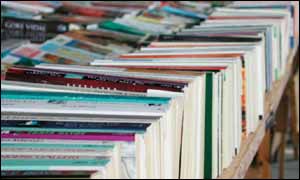| CATEGORIES | TV | RADIO | COMMUNICATE | WHERE I LIVE | INDEX | SEARCH | |||||||
|
| You are in: Sci/Tech | |||||||||||||||||||||||||||||||||
|
Monday, 17
June, 2002, 11:44 GMT 12:44 UK
Copyright rows ring down the centuries

Pirated
books caused some of the first copyright rows
The debates today are about recorded music and movies but a similar debate was being had before the first voice was recorded or first movie premiered. In 1842 Charles Dickens was on a tour of America reading excerpts from his works to audiences eager to hear the young author. But Dickens did not limit himself to repeating his own words, he also he used his time behind a lectern to berate audiences for pirating his books. During one lecture he even accused American publishers of helping to drive Sir Walter Scott to bankruptcy and an early grave because their rampant bootlegging had vastly reduced the royalties he received from US editions of his works.
Piracy was rampant in the US because the country had refused to sign international treaties protecting copyright. This meant that while British publishers were reluctant to produce books for the US market, Americans seized the "initiative" by pirating best sellers for their home market. Holmes and the pirates Dickens wasn't the only author to suffer. Another victim, Wilkie Collins, produced a small booklet entitled "Considerations on the Copyright Question" that condemned "the habitual perpetration, by American citizens, of the act of theft".
Sir Arthur Conan Doyle's hugely popular Sherlock Holmes stories were also heavily pirated. "At times the situation became almost frantic, as competing publishers would endeavour to produce editions before others could saturate the market," said Don Redmond, author of a book about the pirating of the Holmes stories. In 1891 an American copyright law did come into force although it provided little compensation for existing authors as it didn't apply to works published before that date. Late signing But at the insistence of the American print unions the act demanded that, to gain copyright protection, the first editions of a book had to be printed in the US. This is why we have American editions of books now.
This, despite the fact it had already agreed to recognise a less binding treaty which left the printers' clause intact. Rampant piracy for eager audiences, the lamentations of authors, lost royalties and the desperate efforts of an industry to protect itself from such practices, have an all too modern ring. It could describe the music industry now. Who will benefit? Dr Catherine Seville, an expert on copyright history from the University of Cambridge, says the most modern aspect of the Victorian wrangles over copyright was that it was driven by technology.
"New technologies do mean you can make copies more easily," she says, "but it's never quite as bad as the doomsters say." But, she points out, what has changed is who reaps the benefits of better protection for an artist's works and who is pushing for changes. This time it is not just the artists struggling for due credit. Changes to copyright laws or the use of technology to stop copying are not going to benefit musicians or struggling movie makers. Instead it's the big guns - the music publishers and record companies - who most fear the menace of the CD burner, says Dr Seville. And it is they that stand to reap the biggest rewards from new copyright legislation. |
See also:
Internet links:
The BBC is not responsible for the content of external internet sites Top Sci/Tech
stories now:
Links to
more Sci/Tech stories are at the foot of the page.
|
|||||||||||||||||||||||||||||||
| Links to more Sci/Tech stories |
|
|
||
| ^^ Back to top News Front Page | World | UK | UK Politics | Business | Sci/Tech | Health | Education | Entertainment | Talking Point | In Depth | AudioVideo ---------------------------------------------------------------------------------- To BBC Sport>> | To BBC Weather>> ---------------------------------------------------------------------------------- © MMII | News Sources | Privacy |
||